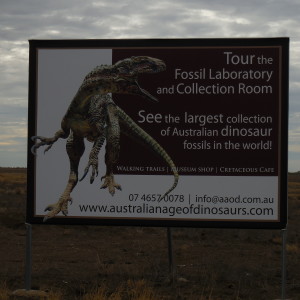 Three days and 2068 km after saying goodbye to Darwin we finally reached Winton, dinosaur capitol of central out back Queensland. It had been three days of dry hot flat desert and I was keen to reach the museum first thing in the morning. Twenty minutes out of town we reached the turn off, an unsealed road not really suitable for our car. Now I admit that when one is travelling in the outback you really should be in a four wheel drive as we had learnt previously with our unexpected flat tyre, but we had come this far, I was not going to let this minor obstacle make me miss out on something I had anticipated for many years. We agreed to continue on, slowly and carefully, four wheel drives overtook us, billowing up great gusts of dust in their wake as they rushed to reach the museum to start work for the day.
Three days and 2068 km after saying goodbye to Darwin we finally reached Winton, dinosaur capitol of central out back Queensland. It had been three days of dry hot flat desert and I was keen to reach the museum first thing in the morning. Twenty minutes out of town we reached the turn off, an unsealed road not really suitable for our car. Now I admit that when one is travelling in the outback you really should be in a four wheel drive as we had learnt previously with our unexpected flat tyre, but we had come this far, I was not going to let this minor obstacle make me miss out on something I had anticipated for many years. We agreed to continue on, slowly and carefully, four wheel drives overtook us, billowing up great gusts of dust in their wake as they rushed to reach the museum to start work for the day. 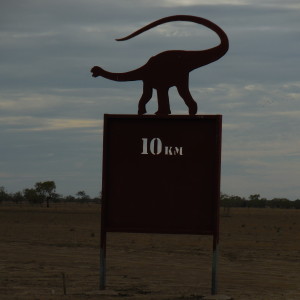
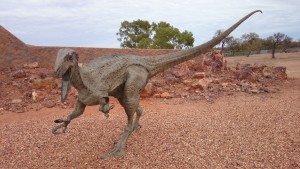 The Australian Age of Dinosaurs Museum did not disappoint! We booked into both tours. Firstly the tour of the working laboratory which is the largest in the Southern Hemisphere. Here we were told, believe it or not, that they only go out on digs for three weeks a year. They find and collect so many bones that they now have a backlog collection to clean up and classify that will take at least ten years to work through! They now house the worlds largest collection of dinosaur bones and we were able to walk passed most of them! Throughout the tour the guide gives a wonderful and thorough explanation of how the first bone was discovered, plus the reasons behind why the area is prolific with dinosaur bones and why it was so important to build the working museum on the site. You are even given time to watch them clean debris from bone fragments.
The Australian Age of Dinosaurs Museum did not disappoint! We booked into both tours. Firstly the tour of the working laboratory which is the largest in the Southern Hemisphere. Here we were told, believe it or not, that they only go out on digs for three weeks a year. They find and collect so many bones that they now have a backlog collection to clean up and classify that will take at least ten years to work through! They now house the worlds largest collection of dinosaur bones and we were able to walk passed most of them! Throughout the tour the guide gives a wonderful and thorough explanation of how the first bone was discovered, plus the reasons behind why the area is prolific with dinosaur bones and why it was so important to build the working museum on the site. You are even given time to watch them clean debris from bone fragments.
During the second tour we were able to watch a film explaining the topography and changes in geology of the area from the dinosaur era to today. We were shown fragments of bones found in the area of the two main dinosaurs, Banjo and Matilda, that put Winton on the map and made fossil hunting so significant to Australian scientists. Research into these amazing creatures continues to fascinate adults and children to this day and at this facility everyone can come together to share their passion.
The museum stands atop a rocky plateau that overlooks the dry open plains where all the dinosaurs are dug up among the farmers cattle stations. Hard to believe that 65 million years ago this was once a lush rainforest and swampland. The view however, is spectacular. 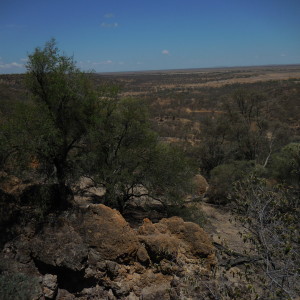
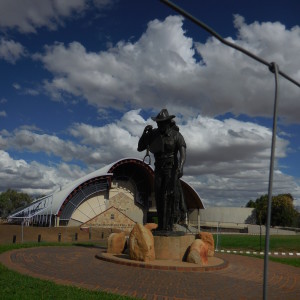 Next stop was Longreach. A fabulous old country town and one not to be missed. Plenty of character and charm and of course the Stockman's Hall of Fame. An amazing museum in itself, too big to go into great detail here. Suffice to say if you ever want to know anything about the outback way of life, from stockmen, pioneers, shearers, pilots, teachers, miners, and the Royal Flying Doctor Service, it's all here. Plan to spend hours meandering through the galleries as there is so much to look at and learn. My favourite part of the exhibition would have to have been the swagman that came to life to tell a bush story of life in the saddle. His facial expressions were magnificent.
Next stop was Longreach. A fabulous old country town and one not to be missed. Plenty of character and charm and of course the Stockman's Hall of Fame. An amazing museum in itself, too big to go into great detail here. Suffice to say if you ever want to know anything about the outback way of life, from stockmen, pioneers, shearers, pilots, teachers, miners, and the Royal Flying Doctor Service, it's all here. Plan to spend hours meandering through the galleries as there is so much to look at and learn. My favourite part of the exhibition would have to have been the swagman that came to life to tell a bush story of life in the saddle. His facial expressions were magnificent. 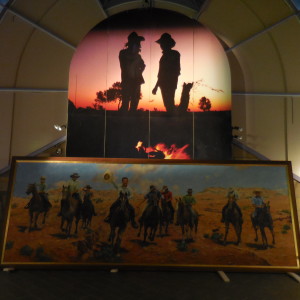
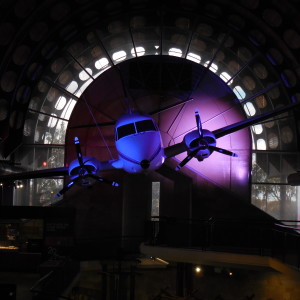 While in Longreach you can also visit the School of the Air. Our son assumed I meant a school to learn to fly. I didn't realise I had never taught him about this important place in Australian history. The school of the air teaches school by radio to children all over the outback that are isolated and cannot reach a school classroom. Unique and iconic in its day it is now taught through Skype. There is also the museum for the Queensland And Northern Territory Air Service, yes QANTAS was born here.
While in Longreach you can also visit the School of the Air. Our son assumed I meant a school to learn to fly. I didn't realise I had never taught him about this important place in Australian history. The school of the air teaches school by radio to children all over the outback that are isolated and cannot reach a school classroom. Unique and iconic in its day it is now taught through Skype. There is also the museum for the Queensland And Northern Territory Air Service, yes QANTAS was born here.
The drive from Longreach to Bourke the next day was a long one. Broken by capturing the odd shot of an emu or two that ran along the side of the road at sunset.
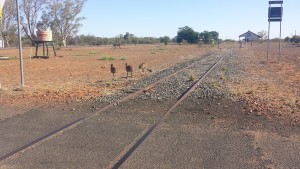 One last day on the road and we finally drove through meandering country roads that rose through the mountains until we felt like we had reached home. Somewhat green rolling hills and rising eucalypts bent to greet us and present a little cool shade. As we turned off the highway and rolled through our valley kangaroos stopped grazing on the side of the road and stood to gaze in the window of our car. I gave a huge sigh, home at last!
One last day on the road and we finally drove through meandering country roads that rose through the mountains until we felt like we had reached home. Somewhat green rolling hills and rising eucalypts bent to greet us and present a little cool shade. As we turned off the highway and rolled through our valley kangaroos stopped grazing on the side of the road and stood to gaze in the window of our car. I gave a huge sigh, home at last!
We had driven nearly 4,000 km in 6 days. Seen some amazing sights. My conclusion, Australia really is a harsh dry wide brown land but I love her.